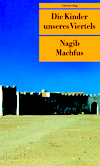
Nagib Machfus: »Al Azhar hat kein Recht, über die Publikation von ›Kinder unseres Viertels‹ zu entscheiden.«
Einer AFP-Meldung aus Kairo folgend, berichteten internationale Medien, Nagib Machfus habe seinen in Ägypten nicht lieferbaren Roman »Die Kinder unseres Viertels« der »höchsten sunnitischen Autorität an der Kairoer Al-Azhar Universität zur Beurteilung vorgelegt und gleichzeitig die Moslem-Bruderschaft um Unterstützung gebeten.« (Siehe auch Die Welt, 1.2.2006)
In Al Ahram (Nr. 779 vom 26. Januar 2006) klärt Nagib Machfus seine Haltung zur Publikation des Romans »Kinder unseres Viertels« in Ägypten.
------------------------------------------------------------------------------
Dialogues of Naguib Mahfouz: Children of the Alley
By Mohamed Salmawy
--------------------------------------------------------------------------------
Salmawy: Tell me about Children of the Alley. Is it banned by Al-Azhar or withheld by you?
Mahfouz: That novel was first serialised in Al-Ahram in 1959. At the time, some of Al-Azhar ulemaa (community of legal scholars) objected to it. But Mohamed Hassanein Heikal, then editor-in-chief, insisted on publishing the entire novel. After the novel was published in full, the late Hassan Sabri El-Kholi called me.
Salmawy: He was the personal representative of President Gamal Abdel-Nasser.
Mahfouz: Not at the time; he was head of press and book publications at the Information Agency. I was on good terms with him; my office was close to his, both in the same building on Talaat Harb Street. He invited me one day to his office and told me that some people from Al-Azhar, among others, wanted to discuss the novel with me. I said fine and he set a date for the meeting. On the appointed date, I went up to El-Kholi's office and we sat together waiting but no one showed up. Then El-Kholi said to me to forget about them since they didn't turn up. We proceeded to discuss the novel and reached an agreement to the effect that he, as head of publications, would ban the novel's publication in Egypt so as not to alienate Al-Azhar. But he told me I may publish it abroad if I wish to. This is the deal that I have honoured ever since.
Salmawy: But book censorship is rare now and El-Kholi passed away.
Mahfouz: When I agreed not to have it published it wasn't upon any censor's orders, but out of the desire not to alienate Al-Azhar. Irrespective of censorship, I made an agreement and will honour it.
Salmawy: But the novel has been published in Beirut and sold all over the Arab world, including Egypt. It was even published in Egypt after Al-Ahram serialised it. Al-Ahali, mouthpiece of the Tagammu Party, published it in full in 1994. Al-Fagr recently published a chapter from it. The American University in Cairo Press published an English edition on your 90th birthday. And it has been published in other languages as well. And Al-Azhar never objected to the publication. Al-Azhar has no authority to ban it.
Mahfouz: No one requested my permission or even told me they were going to publish it. When Al-Ahali published it I was in intensive care after the attempt on my life. No one told me they were going to publish it. And when a chapter from it was published recently, I only learned about it from the newspapers.
Salmawy: Some writers object to Al-Azhar vetting publications.
Mahfouz: They're right. Al-Azhar has no such authority. I chose not to publish the novel in order not to alienate Al-Azhar. Had I decided to publish it, it would have been published, just as Heikal did in Al-Ahram and just as others did after that. Al-Ahram was the only publisher that acted with my knowledge and permission.
Salmawy: Al-Azhar ulemaa are said to be willing to read the novel again, if you ask them to.
Mahfouz: I am not going to do that. This is something for the publisher to do. If I ask Al-Azhar, I would be giving it a right that it doesn't have. I don't want to alienate Al-Azhar, but that's my business. It has nothing to do with Al-Azhar's right to vet books.

